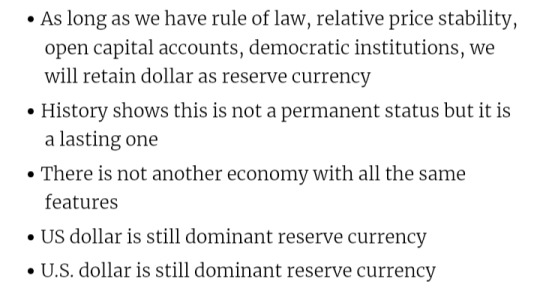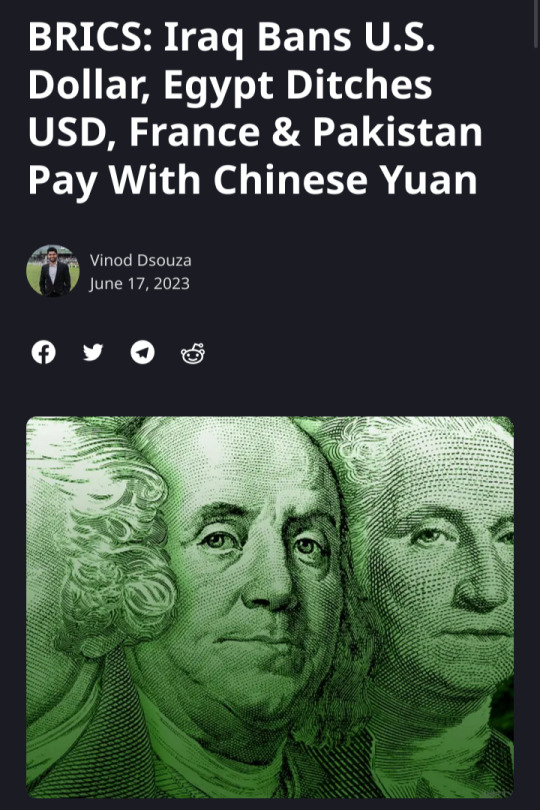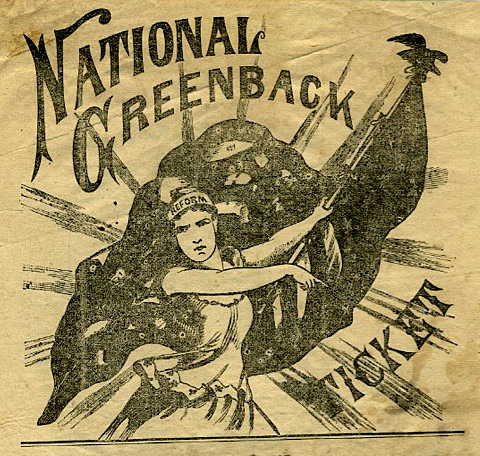#monetary policy
Note
Is there really any difference between the government spending money into circulation rather than lending to private banks?
How would the former allow the government to capture seigniorage rents?
Well, MMT would argue they are essentially the same thing, except that in the latter the government is outsourcing the spending decision-making to the finance sector. They do differ in that lending provides additional liquidity to banks and other financial institutions, and gives the government some income from interest.

As to how "the former allow the government to capture seigniorage rents," essentially the government makes money from the difference between the cost of producing the money and the value of the money. Moreover, when the government spends money into circulation as opposed to lending it into circulation, it also gets the stuff it's spending the money on (and usually at a discount), whether that's goods or services (or labor in general).
17 notes
·
View notes
Text
Brazil’s Central Bank Promotes Pix as Cross-Border Payment Solution

Brazil’s central bank is reportedly looking to take the country’s instant-payment system, Pix, to the global stage.
With policymakers from the Group of 20 nations meeting in Sao Paulo to discuss faster and cheaper cross-border payments, the Central Bank of Brazil considers Pix to be a possible solution, Bloomberg reported Tuesday (Feb. 27).
Pix has quickly become a household name in the country, with over 160 million users adopting the payment method since its launch by the central bank in late 2020, according to the report. Its rapid uptake in Brazil has even surprised its creators, becoming a ubiquitous app in the country within months.
This popularity has attracted interest from authorities in Latin America, Europe and Africa, the report said.
Continue reading.
#brazil#brazilian politics#politics#economy#monetary policy#central bank#mod nise da silveira#image description in alt
7 notes
·
View notes
Text


*closes my eyes and taps my shoes together*
The US Dollar is still the dominant reserve currency
The US Dollar is still the dominant reserve currency
The US Dollar is still the dominant reserve currency

#fed#the fed#federal reserve#monetary policy#economic news#us news#us dollar#multipolar movement#multipolar world#multipolarity#economics news#socialism#communism#marxism leninism#socialist politics#socialist worker#socialist news#socialist#communist#marxism#marxist leninist#progressive politics#politics#jerome powell#us dollar dominance#neoliberalism#neoliberal capitalism#dollar imperialism#us imperialism#imperialism
30 notes
·
View notes
Text
In The Super Mario Bros. Movie (2023), Mario passes by a group of Toads clearly laboring by hitting coin blocks with their heads to farm coins, raising all sorts of troubling questions about the Mushroom Kingdom’s monetary policy
8 notes
·
View notes
Text
Help my post-Canon TOH fic is turning into a discussion of financial and monetary policy.
#the owl house#owl house#toh#toh finale#darius deamonne#toh darius#eda clawthorne#lilith clawthorne#steve toh#money laundering#money#finance#financial#monetary policy
18 notes
·
View notes
Text

3 notes
·
View notes
Text
"The Austrian School of Economics: A Solution to the World's Problems?"
The Austrian School of economics is a heterodox economic theory that emphasizes the role of individual subjective value, entrepreneurship, and the importance of markets in the allocation of resources. It is distinguished from other economic schools by its emphasis on the dynamic and entrepreneurial nature of economic activity, and its view that the economy is constantly evolving and adapting to changing circumstances. The Austrian School is also characterized by its commitment to methodological individualism, which is the idea that social phenomena can only be understood by examining the actions and motivations of individual actors. This emphasis on the subjective experiences and preferences of individual actors is also reflected in the Austrian School's commitment to the subjective theory of value, which holds that the value of a good or service is subjective and determined by the individual valuations of those who exchange it.
One key aspect of the Austrian School is the concept of the business cycle, which refers to the regular fluctuations in economic activity that occur over time. According to the Austrian theory of the business cycle, these fluctuations are caused by the expansion and contraction of credit by banks. When banks expand credit, they make it easier for individuals and businesses to borrow money, which can lead to an increase in investment and economic activity. However, this expansion of credit can also lead to an unsustainable increase in the demand for goods and services, which can result in a misallocation of resources and the emergence of malinvestments. When the credit expansion eventually comes to an end, the demand for goods and services can suddenly drop, leading to a contraction in economic activity and a corresponding drop in the supply of money and credit. This process of credit expansion and contraction can lead to the regular fluctuations in economic activity that are characteristic of the business cycle.
One important concept in the Austrian School of economics is that of economic calculation, which refers to the process by which individuals and businesses make decisions about how to allocate their resources in the face of scarcity. According to the Austrian School, market processes are the most efficient means of economic calculation because they allow individuals to make decisions based on their own subjective preferences and valuations, and provide information about the relative scarcity of different goods and services through the system of prices. When prices are allowed to adjust freely in response to changes in supply and demand, they provide a clear and accurate signal about the relative scarcity of different goods and services. This allows individuals to make informed decisions about how to allocate their resources and optimize their utility.
For example, if one good is experiencing a shortage and its price is higher than another good that is not experiencing a shortage, an individual may choose to purchase the good that is not experiencing a shortage even if they prefer the good that is in short supply. This is because the higher price of the good in short supply reflects its relative scarcity and the individual may be able to obtain more utility by purchasing a greater quantity of the good that is not experiencing a shortage. This process of resource allocation through market prices promotes the most efficient use of resources and contributes to economic growth and prosperity.
The Austrian School argues that subsidies and other forms of market intervention can distort prices and undermine the ability of the market to perform this crucial role in resource allocation. By distorting prices, subsidies can create artificial shortages or surpluses of goods and services, leading to misallocations of resources and inefficiencies in the economy. This can ultimately undermine the ability of the market to promote economic growth and prosperity.
Money is just another good among many in an economy, and like any other good, it is subject to the laws of supply and demand. When the supply of money is increased or decreased, this can have a significant impact on the relative prices of other goods and services in the economy, as well as on the level of economic activity. The Austrian School of economics argues that the state's control of money and its regulation of private alternatives can distort market processes and undermine economic prosperity. By monopolizing the supply of money or over-regulating private alternatives, the state can manipulate the money supply and interfere with the proper functioning of the market. This can lead to misallocations of resources, economic inefficiencies, and ultimately, a lower standard of living for individuals and businesses.
One way to promote economic stability and prosperity is through the denationalization of money, a concept posited by Friedrich Hayek and embraced by many Austrian economists. This idea refers to the proposal that money should be privately produced rather than issued by a central government or bank. The Austrian School argues that private money would be more stable and less subject to manipulation by governments and central banks, and would therefore be more effective at promoting economic stability and prosperity. One way in which private money could be implemented is through the concept of free banking, in which banks are free to issue their own private currencies while also subject to no special regulations beyond those applicable to most enterprises.
Free banking is a monetary system that has the potential to promote greater competition among banks, leading to better quality currencies and a more stable financial system. In a free banking system, banks have an incentive to issue currencies that are widely accepted and maintain their value, as this would increase the demand for their currency and their profits. To achieve this, banks must demonstrate the reliability and trustworthiness of their currency to the public. One way that banks can do this is through a practice called "note-dueling."
Note-dueling is a practice that occurs in a free banking system, in which banks attempt to gather up as much of their rivals' outstanding notes as possible in order to demonstrate the strength of their own currency. This process can be thought of as a form of market discipline, as it incentivizes banks to maintain reasonable reserve ratios in order to be able to honor their promise to redeem their notes for gold or other specie when requested. Competition among note issuers led each bank to try to demonstrate how solid and reliable it was relative to other banks, and this competition effectively regulated the specie reserves held in the banking system. If a bank has a large specie reserve relative to its outstanding note issue, it is better able to honor this promise and maintain the confidence of the public in its currency. On the other hand, if a bank has a small specie reserve relative to its outstanding note issue, it may be at risk of facing a liquidity problem if there is a high demand for note redemption. In this case, the bank may not have enough gold on hand to meet the demand, which could lead to a failure in the bank that did not have enough specie reserve relative to its outstanding note issue.
The Cantillon effect is a phenomenon in economics that refers to the way in which changes in the money supply can have unequal impacts on different parts of the economy. Named after the 18th-century economist Richard Cantillon, the effect suggests that the first recipients of new money tend to benefit the most, while those who receive the new money later on tend to be disadvantaged. This is because the first recipients of new money are able to use it to purchase goods and services before prices have had a chance to adjust to the increased demand, which can lead to higher prices for these goods and services. This can lead to a transfer of wealth from those who receive the new money later on to those who receive it earlier, contributing to economic inequality.
Many Austrian economists advocate for the denationalization of money and the implementation of free banking as a way to mitigate the potential for the Cantillon effect and promote economic stability and prosperity. In a system of free banking, banks are free to issue their own private currencies and compete with one another for customers. This competition can help to ensure that the supply of money and credit is more responsive to market forces and less subject to manipulation by governments and central banks. One aspect of this competition is the process of "note dueling," in which banks attempt to gather up as much of the outstanding note issue of their rivals as possible in order to demonstrate their own reliability and stability. By allowing the market to play a greater role in the supply and demand of money, the Austrian School argues that free banking can help to promote economic stability and reduce the potential for the Cantillon effect to contribute to economic inequality.
In conclusion, the Austrian School of economics offers a unique perspective on economic theory and policy that emphasizes the role of individual subjective value, entrepreneurship, and the importance of markets in the allocation of resources. The theory of the business cycle explains how the expansion and contraction of credit by banks can lead to fluctuations in economic activity, and the concept of denationalization of money proposes that money should be privately produced rather than controlled by the state. The idea of free banking, in which banks are free to issue their own private currencies, is one way in which this concept could be implemented. The Austrian School argues that these ideas have the potential to promote economic stability and prosperity by allowing the supply of money and credit to be more responsive to market forces and less subject to manipulation by governments and central banks. By respecting the role of the individual and the market in the allocation of resources, the Austrian School offers a unique and valuable perspective on economic policy.
#ChatGPT#MorEconomics#Finitude Fighters#MoribundMurdoch#Moribund Institute#Austrian School of economics#Business cycle theory#Denationalization of money#Free banking#Note dueling#Methodological individualism#Subjective theory of value#Economic calculation#Market intervention#Cantillon effect#Economic inequality#Monetary policy#Resource allocation#Economic stability#Economic prosperity
3 notes
·
View notes
Text
Great financial tip! How does the repo rate help control inflation? -2022
The Repo rate, also known as the overnight lending rate, is the rate at which central banks lend money to commercial banks in the event that they need to borrow funds to meet their reserve requirements. When the central bank increases the repo rate, it becomes more expensive for commercial banks to borrow money, which can help to reduce inflation. Read More

2 notes
·
View notes
Photo

#studyblr#notes#economics#economics notes#my notes#econ#econ notes#notes on econ#notes on economics#microeconomics#macroeconomics#mild recessionary gap#recessionary gap#unemployment#moderate unemployment#fiscal policy#monetary policy
4 notes
·
View notes
Note
Does fiat, sovereign money (greenback), and metal backed currency have any differing effects on MMT? and do you have your own opinion on which the US should have stuck with?
Yes. You can't really do MMT, or indeed a lot of modern economic policymaking, with a gold standard. (That's one of the major purposes of having a metallic standard.)
As to your second question, the U.S would have been in a much better place in the 19th century (especially for workers and farmers, i.e the vast majority of the American people) had it stayed on the fiat currency model after the Civil War and never looked back, rather than returning to the gold standard.

The Greenback Party was right.
11 notes
·
View notes
Text
The main focus of attention for the decision on the Brazil's base interest rate this week

Brazil's central bank is expected to announce a cut to the base interest rate this week, but market participants are likely to be more focused on the monetary authority's message than on the decision itself.
On March 20, the bank is forecast to reduce the Selic rate by another 50 basis points to 10.75%.
"The central bank will almost certainly cut the Selic rate by 50 basis points on Wednesday. I think the key will be whether they change the forward guidance in the accompanying communications," William Jackson, chief emerging markets economist at Capital Economics, told BNamericas.
"It’s hard to know whether they’ll do this, but my sense is that, given the strength we’ve seen in some of the underlying inflation data, the central bank will become less committed to continuing to cut rates in 50 basis-point steps, perhaps leaving the door open to smaller cuts from the June [central bank rate committee] Copom meeting," he added.
Continue reading.
#brazil#brazilian politics#politics#economy#central bank#monetary policy#mod nise da silveira#image description in alt
3 notes
·
View notes
Text
https://www.fiverr.com/s2/6c38e5e771
Check it out. Ur own digital portrait in 5 dollars🧿♥️




#fiver gigs#fiverr#fiverun#fiverseller#what you can buy for a fiver on the high street – the same as a fancy coffee#make money fast#make money websites#money in the bank#monetary policy#free money#digital illustration#digitalcurrency#digital aritst#digital drawing#digital portrait#digital collage#digital commisions#digital arwork#drawing#art#artists on tumblr
3 notes
·
View notes
Text
Morning Bid: Eyes switch to earnings, China trade miss, tense Middle East
A look at the day ahead in U.S. and global markets from Mike Dolan
With markets now re-shuffling central bank rate cut calendars, attention switches abruptly to the first quarter U.S. corporate earnings season on Friday – against a backdrop of an alarming swoon in China trade last month and rising Middle East tension.
As usual, the big U.S. banks are first out of the traps and are preparing to…
View On WordPress
#central bank rate#China#corporate earnings#Federal Reserve#Global Markets#Mike Dolan#monetary policy#Wall Street Journal report
0 notes
Link
#economics#economy#recession#2008 recession#interest rates#yield curve#liquidity trap#2011#u.s. treasury#treasury bonds#treasury bills#monetary stimulus#monetary policy#debt ceiling#deficit#federal reserve#great recession 2008
0 notes
Text
Crypto News: Bitcoin Dips Below $70K, Core Glory Continues

Crypto News Key Highlights:
Tinkoff , a leading Russian bank, obtained a license to issue and utilize Digital Financial Assets (DFAs). Coin Gabbar reported its addition to the Central Bank of Russia's approved DFA operators list. This move followed Sberbank's launch of a DFA Trading Platform, prompting Tinkoff to seek inclusion in the DFA register. Russia's increasing efforts in digital financial assets aim to mitigate economic sanctions, fostering wider cryptocurrency acceptance globally.
Bitkub Capital Group Holdings, Thailand’s top crypto exchange owner, plans an IPO in 2025 amid tough competition from Binance and Kasikornbank Pcl. Regulatory shifts and strategic divestments signal its determination to stay ahead and secure growth funds.
OpenAI expands into Asia, launching its first office in Tokyo, Japan. The move aims to provide tailored AI services and assist in shaping regulatory frameworks amid global AI demand. This marks OpenAI's third international expansion after London and Dublin. Japan's innovative approach to AI regulation makes it an attractive market for OpenAI's growth.
To Know more- Crypto News: Bitcoin Dips Below $70K
#Crypto Currency#10 BTC#As Bitcoin#MEW#ETH NFTs#Tether#Federal funds rate#Federal Reserve System#Jerome Powell#Monetary policy
0 notes
Text
Episode #170 - Brent Johnson and the TINA Effect of the US Dollar
Brent “Dollar Milkshake” Johnson (though I know he hates that term) comes back to the cast to update our conversation from last year. Brent and i take a good hard look at the state of global dollar liquidity, the state of our bond markets and who is most vulnerable to a stronger dollar over the next two years.
Show Notes:
Episode #152 Brent Johnson and Why the Dollar Has a Long Road…

View On WordPress
0 notes